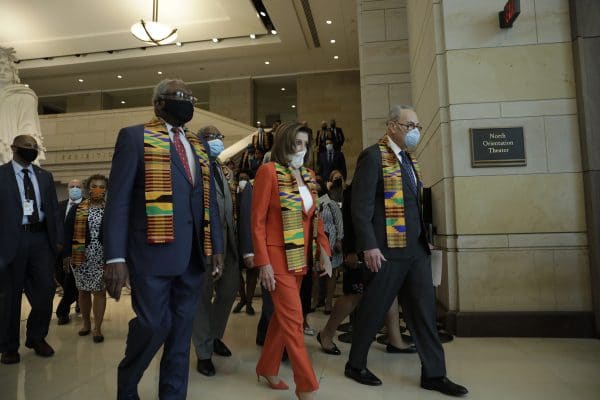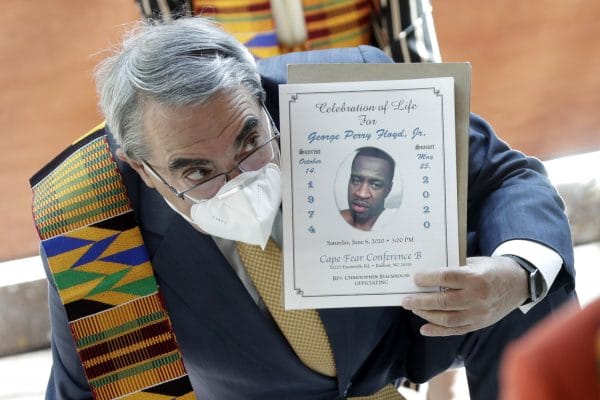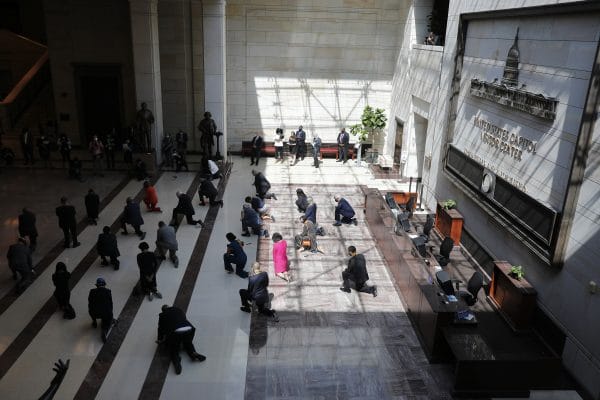House Democrats on Monday unveiled a legislative blueprint for reforming policing policies, responding to the nationwide protests calling for change after the death of George Floyd.
The bill, led by Congressional Black Caucus Chairwoman Karen Bass, D-Calif., and Sen. Kamala Harris, D-Calif., includes reforms making it easier to sue police officers for misconduct in civil court and to prosecute them for criminal behavior.
It would also prohibit the use of chokeholds and certain no-knock warrants by police nationwide, and give the Justice Department civil rights division subpoena power to investigate local police departments.

U.S. House Speaker Nancy Pelosi (D-Calif.) with Senate Minority Leader Chuck Schumer (D-N.Y.) and Congressional Democrats arrive to observe a moment of silence for eight minutes and 46 seconds to honor George Floyd, Breonna Taylor, Ahmaud Arbery and others, on Monday, June 8, 2020 on Capitol Hill in Washington, D.C. (Yuri Gripas/Abaca Press/TNS)
The bill also mandates the use of body cameras, bans the transfer of certain military equipment to police departments, creates a national database disclosing the names of officers with a pattern of abuse, and would eliminate the legal shield protecting police from lawsuits.
“Never again should the world be subjected to witnessing what we saw on the streets in Minneapolis: the slow murder of an individual by a uniformed police officer,” Bass said.
Video showed the white officer, Derek Chauvin, with his knee on Floyd’s neck for more than eight minutes as the unarmed black man was handcuffed and pleading that he could not breathe. The four officers involved in Floyd’s arrest were fired and now face charges in his death.
In the two weeks since, hundreds of thousands of Americans in all 50 states have protested and demonstrated demanding change.
Before unveiling the police reform bill at a news conference, House and Senate Democrats met in the Capitol’s Emancipation Hall for eight minutes and 46 seconds of silence.

U.S. House Speaker Nancy Pelosi (D-Calif.) with Senate Minority Leader Chuck Schumer (D-N.Y.) and Congressional Democrats observe moment of silence for eight minutes and 46 seconds to honor George Floyd, Breonna Taylor, Ahmaud Arbery and others, on Monday, June 8, 2020 on Capitol Hill in Washington, D.C. (Yuri Gripas/Abaca Press/TNS)
“Empathy and sympathy and words of caring for those who have died and suffered are necessary. But it is not enough,” Sen. Cory Booker, D-N.J., said at the news conference. “We must change laws and systems of accountability. We must pass legislation that makes our common values and our common ideals real in the law of our land.”
Without significant support from Senate Republicans, who control that chamber, any legislation passed by House Democrats is unlikely to reach President Donald Trump’s desk.
Senate Minority Leader Charles E. Schumer, D-N.Y., said Democrats weren’t going to let the issue fade away.
“In the Senate, Democrats are going to fight like hell to make this a reality,” Schumer said. “Now we must collectively, all Americans, raise our voices and call on (Senate Majority) Leader (Mitch) McConnell to put this reform bill on the floor of the Senate before July to be debated and voted on.”
Bass said the national protests, and the extremely high level of support for them in national polls, gave Democrats confidence that legislation could pass at this time.

Congressman G. K. Butterfield (D-N.C.) holds a portrait of George Floyd as Congressional Democrats observe moment of silence for eight minutes and 46 seconds to honor George Floyd, Breonna Taylor, Ahmaud Arbery and others, on Monday, June 8, 2020 on Capitol Hill in Washington, D.C. (Yuri Gripas/Abaca Press/TNS)
Not included in the bill is any nod toward the idea of “defunding the police” or reallocating police budgets toward other social services such as housing and mental health or substance abuse treatment, which some activists began calling for over the weekend.
Decisions about department funding levels are left at the state and local levels.
“I can’t imagine that (kind of funding decision) happening in a federal way,” Bass said, “but let me just tell you that part of that cry is a desire for there to be significant higher investment in communities, looking at why police are needed, what happens, what are the root causes of the problems in communities.”
House Speaker Nancy Pelosi, D-Calif., said there might be legislation in the future focused on “rebalancing” funding to address systemic disparities.
Republicans seized on the “defund the police” messaging Monday.

U.S. House Speaker Nancy Pelosi (D-Calif.) and Congressional Democrats observe a moment of silence for eight minutes and 46 seconds to honor George Floyd, Breonna Taylor, Ahmaud Arbery and others, on Monday, June 8, 2020 on Capitol Hill in Washington, D.C. (Yuri Gripas/Abaca Press/TNS)
“LAW & ORDER, NOT DEFUND AND ABOLISH THE POLICE. The Radical Left Democrats have gone Crazy!” Trump said in a tweet shortly before the news conference.
Rep. Lisa Blunt Rochester, D-Del., dismissed Republicans as the “masters of distraction” and said Democrats were focused on the broad, systematic reforms included in the bill.
“We are keeping our eyes on the prize,” she said.
___
© 2020 Los Angeles Times
Distributed by Tribune Content Agency, LLC.



